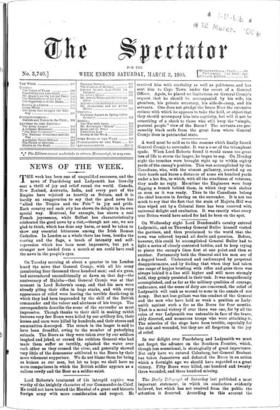On Tuesday morning at about a quarter to ten London
heard the news that General Cronje, with all his army (numbering four thousand three hundred men) and six guns, had surrendered unconditionally at dawn on that day—the anniversary of Majuba—that General Cronje was at that moment in Lord Roberts's camp, and that his men were already piling their rifles in huge stacks, and with every appearance of relief were leaving the terrible death-trap in which they had been impounded by the skill of the British commander and the valour and alertness of his troops. The correspondents describe the scene of the surrender as most impressive. Though thanks to their skill in making rabbit burrows very few Boers were killed by our artillery fire, their horses and oxen were killed by hundreds, and their stores and ammunition destroyed. The stench in the laager is said to have been dreadful, owing to the number of putrefying animals. The Boers as they were taken over by our soldiers laughed and joked, or cursed the ruthless General who had made them suffer so terribly, splashed the water over each other as they crossed the river, and generally showed very little of the demeanour attibuted to the Boers by their more vehement supporters. We do not blame them for being as human as our men, but let us hope we shall have no more comparisons in which the British soldier appears as a callous rowdy and the Boer as a soldier-saint.






































